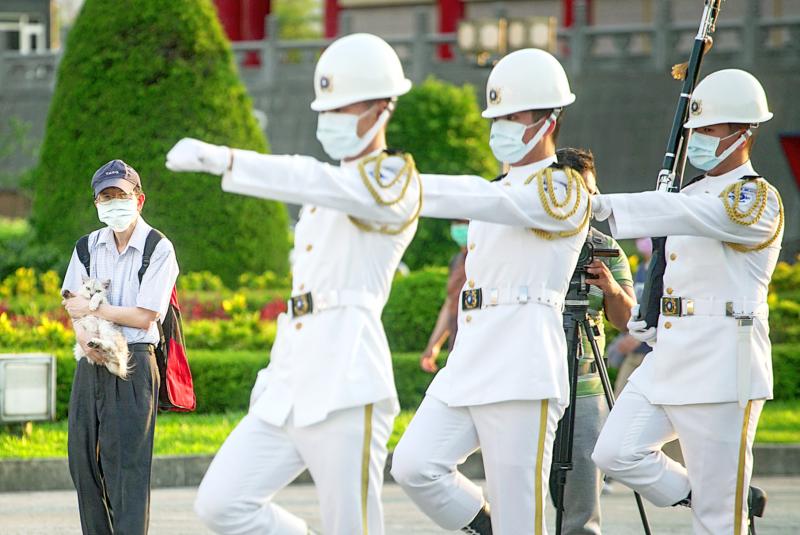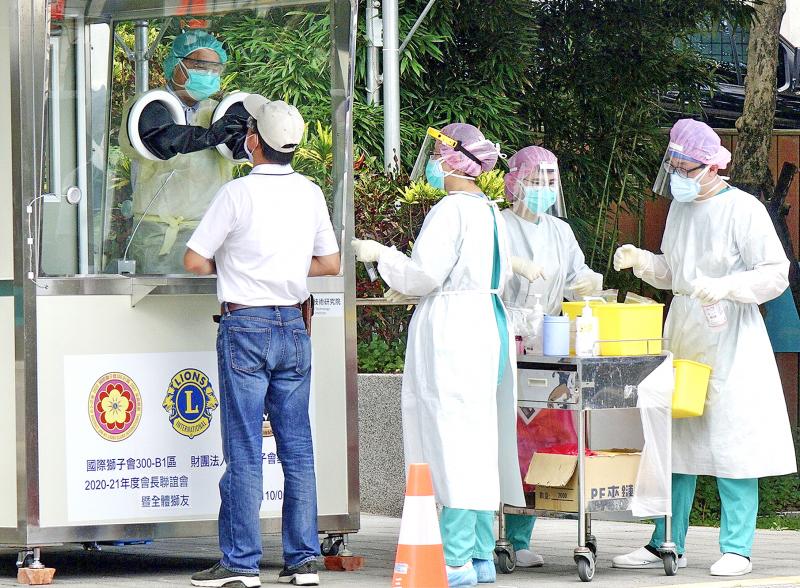The COVID-19 situation appears to be relatively stable and on a downward trend, Minister of Health and Welfare Chen Shih-chung (陳時中) said yesterday, as he reported 185 domestic COVID-19 cases and 15 deaths.
“This seems to be a relatively good sign,” Chen, who heads the Central Epidemic Command Center (CECC), told a daily news briefing.
In Taipei and New Taipei City, the overall situation seems to be heading in a good direction, he added.

Photo: CNA
He attributed it to public efforts to control the spread of the virus, but warned people against letting their guard down.
Of the new local cases, 83 are males and 102 are females, from younger than five to older than 90, the center said.
The onset of their symptoms was between May 28 and Sunday, it said.

Photo: Peter Lo, Taipei Times
New Taipei City had the most local infections, with 98 cases, followed by 42 in Taipei, it said.
Keelung had 14 cases, Taoyuan had 10, Miaoli County had seven, Hualien County had four, Changhua and Hsinchu counties reported three cases each, Yilan County recorded two cases, and Taichung and Yunlin County each had one case, it said.
Of the 45 domestic cases reported outside Taipei and New Taipei City, 37 had known sources of infection, five had unclear connections with other cases and three were under investigation, it said.
The 15 deaths were nine men and six women in their 50s to 90s, the center said, adding that only one of them did not have a chronic health condition.
They experienced an onset of symptoms between May 10 and Tuesday last week. They were confirmed to have COVID-19 between May 18 and Sunday, and died between June 5 and Sunday, the center said.
Of the 11,547 confirmed COVID-19 cases recorded from May 11 to Saturday, 5,802 people, or 50.2 percent, have been released from isolation, the center said.
The nation on June 4 recorded the highest number of patients being treated in hospital rooms dedicated to people with COVID-19, at 2,539 patients, said Centers for Disease Control (CDC) Deputy Director-General Philip Lo (羅一鈞), deputy chief of the CECC’s medical response division.
The number of people hospitalized with COVID-19 has been on a downward trend since that peak, he added.
As of yesterday morning, the number of people being treated in dedicated COVID-19 rooms across the nation had fallen 14 percent from the peak to 2,198, Lo said.
The number of COVID-19 patients in intensive care peaked at 435 on June 7, he said.
That figure has also continued to decline over the past week, he said.
As of yesterday, 389 COVID-19 patients nationwide were in intensive care, he said.
Meanwhile, as the nation prepares to expand vaccinations to more priority groups starting today, Chen urged people to show their support to local disease control personnel.
People lining up for COVID-19 vaccinations should maintain social distancing and wear a mask, he said.

The US government has signed defense cooperation agreements with Japan and the Philippines to boost the deterrence capabilities of countries in the first island chain, a report by the National Security Bureau (NSB) showed. The main countries on the first island chain include the two nations and Taiwan. The bureau is to present the report at a meeting of the legislature’s Foreign Affairs and National Defense Committee tomorrow. The US military has deployed Typhon missile systems to Japan’s Yamaguchi Prefecture and Zambales province in the Philippines during their joint military exercises. It has also installed NMESIS anti-ship systems in Japan’s Okinawa

‘WIN-WIN’: The Philippines, and central and eastern European countries are important potential drone cooperation partners, Minister of Foreign Affairs Lin Chia-lung said Minister of Foreign Affairs Lin Chia-lung (林佳龍) in an interview published yesterday confirmed that there are joint ventures between Taiwan and Poland in the drone industry. Lin made the remark in an exclusive interview with the Chinese-language Liberty Times (the Taipei Times’ sister paper). The government-backed Taiwan Excellence Drone International Business Opportunities Alliance and the Polish Chamber of Unmanned Systems on Wednesday last week signed a memorandum of understanding in Poland to develop a “non-China” supply chain for drones and work together on key technologies. Asked if Taiwan prioritized Poland among central and eastern European countries in drone collaboration, Lin

NO CONFIDENCE MOTION? The premier said that being toppled by the legislature for defending the Constitution would be a democratic badge of honor for him Premier Cho Jung-tai (卓榮泰) yesterday announced that the Cabinet would not countersign the amendments to the local revenue-sharing law passed by the Legislative Yuan last month. Cho said the decision not to countersign the amendments to the Act Governing the Allocation of Government Revenues and Expenditures (財政收支劃分法) was made in accordance with the Constitution. “The decision aims to safeguard our Constitution,” he said. The Constitution stipulates the president shall, in accordance with law, promulgate laws and issue mandates with the countersignature of the head of the Executive Yuan, or with the countersignatures of both the head of the Executive Yuan and ministers or

BACK TO WORK? Prosecutors said they are considering filing an appeal, while the Hsinchu City Government said it has applied for Ann Kao’s reinstatement as mayor The High Court yesterday found suspended Hsinchu mayor Ann Kao (高虹安) not guilty of embezzling assistant fees, reducing her sentence to six months in prison commutable to a fine from seven years and four months. The verdict acquitted Kao of the corruption charge, but found her guilty of causing a public official to commit document forgery. The High Prosecutors’ Office said it is reviewing the ruling and considering whether to file an appeal. The Taipei District Court in July last year sentenced Kao to seven years and four months in prison, along with a four-year deprivation of civil rights, for contravening the Anti-Corruption